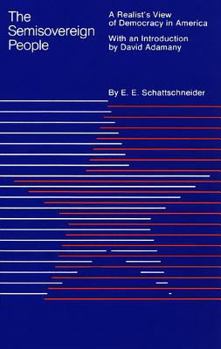The Semi-Sovereign People: A Realist's View of Democracy in America
Select Format
Select Condition 
Book Overview
No Synopsis Available.
Format:Paperback
Language:English
ISBN:0030133661
ISBN13:9780030133664
Release Date:March 1975
Publisher:Cengage Learning
Length:180 Pages
Weight:0.47 lbs.
Dimensions:0.4" x 5.3" x 8.3"
Customer Reviews
5 ratings
A classic and a must read. This 'Realist' view rips the 'pluralist.'
Published by Thriftbooks.com User , 16 years ago
This a sharp and well written monograph. Schattschneider's ideas of the "mobilization of bias" and politics as conflict as well as his critique of pluralism (or "groupist" theory) are well known and easy enough to summarize. For that reason I put off reading this book for years. That was a mistake. He explains his views better and clearer than text-book summaries and his critique is nuanced and quotable. The book is cheap and tiny - spare 10 bucks (used version) and an afternoon and enrich your understanding of politics.
A classic work in American politics
Published by Thriftbooks.com User , 16 years ago
E. E. Schattschneider was one of the most important political scientists of the middle part of the 20th century. His work has had an influence on many analysts of politics. This slender volume, although brief, is one of his more provocative and influential works. Ideas from this book show up in the work of many others. Let's take a look at just two of the many provocative points that he makes. A central assumption underlying the work (Page v): ". . .the nature of political organization depends on the conflicts exploited in the political system, which ultimately is what politics is about." Understanding the scope of conflict is a central question in this book. Some want to keep conflict narrowly constrained and "private." If so, economic powerhouses will win out, because they would be dominant in that domain. Others, who wish government to get involved, try to broaden the scope of conflict so that political institutions get involved. If this is the case, then a different dynamic will be at work. In his view (Page 12), "Democratic government is the greatest single instrument for the socialization of conflict in the American community." By widening the scope of conflict, the people can become important players. A second important argument that he makes represents a critique of the view that democracy is enhanced by the existence of organized interest groups, since these represent the views of many people and inject a democratic influence into the political process. Schattschneider demurs. First, the members of these interest groups are not typical of all people. In a famous line, he notes that (Pages 34-35): "The vice of the groupist theory is that it conceals the most significant aspect of the system. The flaw in the pluralist heaven is that the heavenly chorus sings with a strong upper-class accent. Probably about 90% of the people cannot get into the pressure system." Anyway, this is a wonderful little book. Of course, there are some issues that emerge: sometimes arguments are not developed enough (brevity in this book is a plus, but it sometimes seems to leave some points "hanging"); he may downplay some positive aspects of the interest group system. However, in the main, his arguments remain as fresh today as they were when the book first came out, in 1960. Still worth a read!
Brilliant, but move on
Published by Thriftbooks.com User , 24 years ago
I can only agree with the other reviewers. This is as good as political science gets. Pure brilliance.When you have read this book - you really should! - then you can move on to more current studies that uses Schattschneider's ideas and develops them much further. Rochefort & Cobb: "The Politics of Problem Definition", Baumgartner & Jones: "Agendas and Instability in American Politics", Cobb & Ross: "Cultural Strategies of Agenda Denial" and Jones: "Reconceiving Decision-Making in Democratic Politics" should all interest you once you've fallen in love with the thoughts of Schattschneider. Your view of politics will never be the same again.
Brilliant, simple and true.
Published by Thriftbooks.com User , 24 years ago
I first read this book in college and have never forgotten it. During careers in politics, business and the church I've found myself returning again and again to Schattschneider's key themes. From his discussion of conflict and its scope to his simple point that whomever controls the agenda controls the outcome, Schattschneider has captured the essence of human interaction. Nearly forty years old, this is still a superb book not to be missed.
A classic account of western democracy
Published by Thriftbooks.com User , 24 years ago
This often-quoted book is one of the most classic works of 20th century political science. Despite its age, published in the early 1960s, this brilliant little book is still astonishingly fresh. Schattschneider's account of the expansion and privatisation (contraction) of conflicts, and his description of the structural biases of modern western democracy, is eye-opening. The book is very accessible, yet scholary. This is one of the best, most important, and in a strange way morally refreshing, books on politics I have ever come across.





